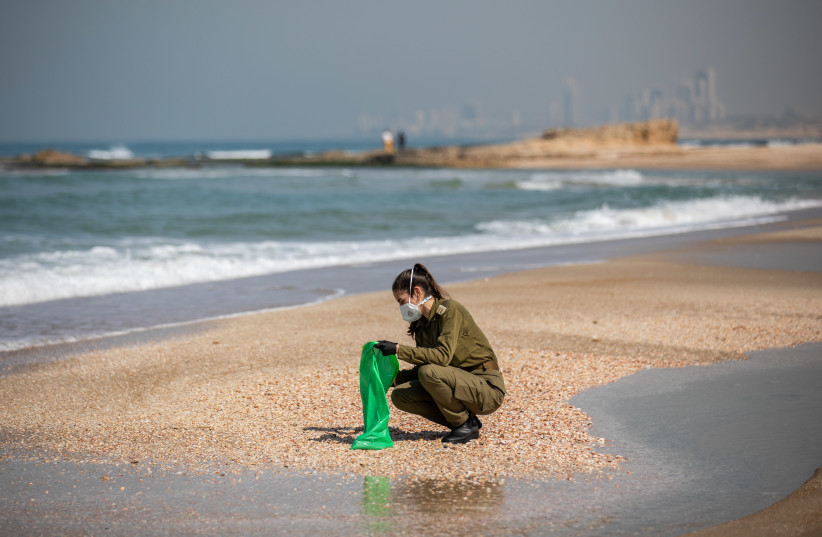Teams dispatched by the Environmental Protection Ministry failed to find any oil patches on Wednesday afternoon, after the ministry was alerted earlier about suspected oil patches being spotted.
EcoOcean, a nonprofit Israeli organization that works to protect the marine environment, announced that its first response vessel and additional vessels which had been recruited due to the suspected oil spill had failed to find any oil patches or pollution. Due to a storm expected to hit the area tomorrow, operations in the sea will be unable to continue for the time being.
The Environmental Protection Ministry will continue to man the situation room in Haifa and will have inspectors along the coasts on Wednesday to locate any suspicious findings. The ministry is testing seawater samples, with results expected to be received in the coming days. The IDF will also continue to monitor.
The alert had raised concerns from NGOs and activists that the country was woefully unprepared for such an incident a year after an oil spill caused an ecological disaster along Israel's shores.
On Tuesday, the European Maritime Safety Agency (EMSA) notified the Environmental Protection Ministry about a suspected oil patch. The Environmental Protection Ministry failed at first to find any signs of an oil patch, but aircraft from the defense establishment were later able to find signs of suspected oil patches about 20 to 40 kilometers west of the coast ranging between Rishon Lezion and Netanya.

The Environmental Protection Ministry had categorized the suspected oil patches as being Tier 3-level concern, meaning that it had the potential to be a major marine pollution event on a regional or national scale. In comparison, the spill last year was designated as a Tier 2 incident.
"The incident has once again demonstrated the extent to which the ministry is leading national preparations for the treatment of marine oil pollution and that other authorities have assimilated their duty to also prepare for any scenario," said Environmental Protection Minister Tamar Zandberg. "We prefer to be in a situation where we acted quickly and treated the event as a national event, and are glad that the suspicion was checked and ruled out."
Zandberg stressed that the situation proved the need to approve the National Contingency Plan for Preparedness and Response to Combating Marine Oil Pollution.
As news of the suspected oil spill was published activists expressed outrage that Israel still had not implemented recommendations issued by a forum of director-generals after last year's incident.
"A year since the oil disaster at sea and Israel has not learned its lesson," said Mor Gilboa, director-general of the Israeli NGO Zalul, on Wednesday. "The huge oil slick that is making its way to the shores of Netanya at the moment and threatens to strike the marine environment again is far beyond another warning sign."
Gilboa stressed that the situation is an ongoing failure by the Environmental Protection Ministry and the Finance Ministry who have not implemented the conclusions reached by a committee that convened after the oil spill last year and have not promoted the National Contingency Plan for Preparedness and Response to Combating Marine Oil Pollution.
"The great absurdity is that in parallel with the unwillingness to deal with such disasters, Israel continues to promote dozens of offshore oil and gas exploration wells that further increase the likelihood of offshore oil disasters, damaging ecosystems and seawater that Israel is so dependent on to desalinate its drinking water," added Gilboa.
Arik Rosenblum, director-general of EcoOcean, also expressed dissatisfaction with the country's lack of preparedness for oil pollution incidents, saying that despite the "clear and unequivocal decisions" reached by the director-general's forum, "no one is acting on the matter and we have been caught yet again when we were not prepared for the next disaster."
"The dangers are clear and existent, ignoring them would be an irresponsible step," added Rosenblum. "We appreciate the intention of the Environmental Protection Ministry headed by Minister [Tamar] Zandberg and understand her limitations, but without the transfer of budgets, we will not be able to continue to maintain the volunteer array, and also, in the absence of emergency tools and equipment, we can not provide an effective response."
The Environment and Climate Change portal is produced in cooperation with the Goldman Sonnenfeldt School of Sustainability and Climate Change at Ben-Gurion University of the Negev. The Jerusalem Post maintains all editorial decisions related to the content.
